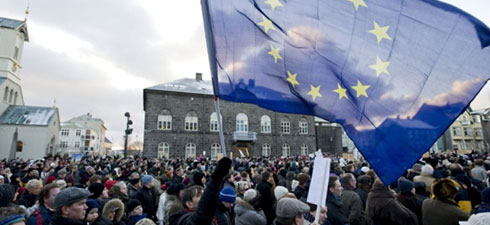“The Prime Minister Johanna Sigurdardottir has vigorously agitated for this result following the country’s financial collapse,” Le Figaro comments, hailing the news over in Reykjavik. The fact that Iceland is almost a de facto member of the Union due to the EEA agreement, which brought the island into the European single market but without representation in EU institutions, prompts Belgian daily Le Soir to wonder whether Iceland could not benefit from speedy integration. “The negociations could be quickly a wrap”, it comments. Over in Brussels, the omens look good. President José Manuel Barroso, relates the Financial Times, sees in the Icelandic vote evidence of the “vitality of the European project” and the “hope that Europe represents”.
However, the tightness of the vote 33 for and 28 against “speaks volumes for the uncertain conversion of these islanders on the road to Brussels.” puns Adriana Cerretelli in Italian daily Il Sole 24 Ore. Her words are echoed in the Guardian by Icelandic academic Eirikur Bergmann. Accession and adoption of the euro may well “stabilise Iceland's tiny currency the krone,” but there remains the thorny issue of Iceland’s staggering debts. Icelanders are particularly outraged by the Icesave agreement recently thrashed out with Holland and the UK, in which the government, via the Icelandic taxpaper, has engaged to reimburse €2.3 billion to British and Dutch investors caught by the meltdown of one of Iceland’s main banks. This is more, Bergmann points out, “than the Germans were forced to pay with the Versailles treaty.” “It is a widespread belief in the country that this ill-received agreement is a result of Icelandic amateurs coming up against shrewd British and Dutch professionals.” The agreement, due to be voted in parliament, could well be rejected. Which could complicate Iceland's EU application.
It doesn’t finish here. While Le Soir feels sure that Reykjavik will “beat Croatia to the post,” the latter’s once seemingly certain accession stalled by its border dispute with Slovenia, the FT urges caution. “Though much of EU law already applies in Iceland, negotiations on what remains will be tough,” it writes, citing negociation over fisheries as a major obstacle. “Talk of fast-tracking Icelandic membership is misplaced.” While the barriers to EU membership are not so fundamental as those of Turkey, “it is privately accepted that Iceland could not join before Croatia.”
A thumbs up to accession from Brussels, nevertheless must then be submitted to Iceland’s 180,000 strong electorate for approval by referendum. Il Sole cites a recent Gallup poll that puts citizens' approval of EU accession at 61%. “But it's hard to bet that in three years time, when negotiations will be over, the mood will be the same.” In the same poll, according to Le Figaro, Icelanders “are divided 50/50 as to the question of actual membership.”
All in all, the future for this proudly independent nation is unclear. Le Soir concludes, “geysers are not yet part of our European landscape.” Perhaps, as the FT suggests, much depends on a show of good will from Brussels, “Icelanders should not hold their breath,” it writes, “but the EU must not drag its feet.”
Do you like our work?
Help multilingual European journalism to thrive, without ads or paywalls. Your one-off or regular support will keep our newsroom independent. Thank you!
















